Key takeaways
- Community life coaching emphasizes meaningful dialogue that fosters connections and empowers individuals, enhancing community engagement.
- Town halls serve as vital platforms for accountability, transparency, and collaborative initiatives, helping communities address shared concerns.
- Effective dialogue strategies include creating respectful environments, utilizing small group discussions, and inviting diverse perspectives to enrich conversations.
- Challenges in town hall discussions, such as strong opinions and emotional management, can be addressed through reminders about listening, active outreach, and facilitating emotional awareness.

Understanding community life coaching
Community life coaching, to me, is about more than just guidance; it’s a way to ignite connections and empower individuals within a neighborhood. Have you ever noticed how a simple conversation can open doors to new perspectives? That’s the heart of what community life coaching fosters—meaningful dialogue that builds understanding.
From my experience, coaching in a community setting often uncovers hidden potential in people who might not even realize they have a voice. It’s incredibly rewarding to witness someone gain confidence and start contributing actively to the place they call home. Isn’t that what true community spirit is about?
Sometimes, I reflect on how community life coaching serves as a bridge between personal challenges and collective growth. It’s fascinating how working through shared issues can transform a group from a collection of individuals into a supportive network. Don’t you think communities thrive best when everyone feels heard and valued?
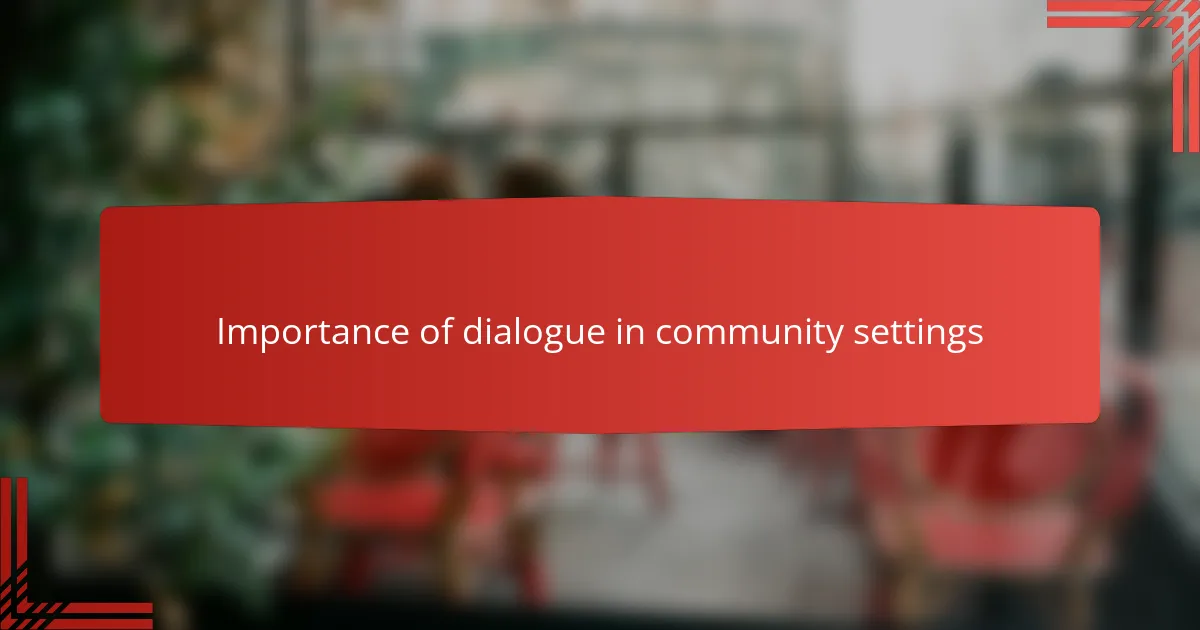
Importance of dialogue in community settings
Dialogue in community settings is more than just people talking; it’s the pulse that keeps the neighborhood alive. I remember attending a town hall in Philadelphia where a heated discussion turned into a breakthrough moment simply because someone chose to listen rather than speak over others. Have you ever felt that power when voices come together, not to clash, but to connect?
There’s an emotional weight to dialogue that can’t be overlooked. When people share their stories and concerns openly, it creates empathy and breaks down walls I never thought possible. I’ve seen neighbors who were once strangers become allies because they found common ground through honest conversations.
What strikes me most is how dialogue fosters trust, the foundation for any thriving community. Without it, issues remain buried and frustration festers. When we encourage dialogue, especially in town halls, we’re giving everyone a chance to step into the circle and be a part of the solution. Isn’t that the kind of community we all want to live in?
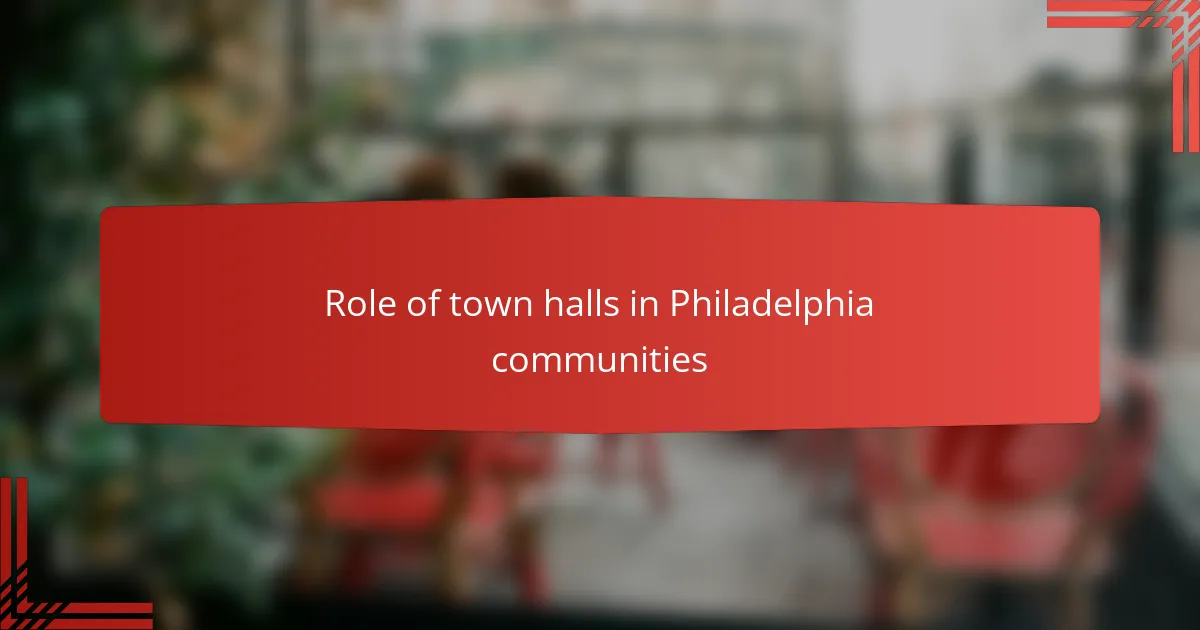
Role of town halls in Philadelphia communities
Town halls in Philadelphia are more than just scheduled meetings; they act as vital spaces where community members gather to express hopes, frustrations, and ideas. I’ve noticed how these gatherings often reveal shared concerns that might have gone unnoticed if not for the chance to speak openly. Doesn’t it feel reassuring when you realize you’re not alone in wanting positive change?
What I find especially important is how town halls bring a sense of accountability and transparency to local issues. When residents and leaders come face to face, it creates a level of trust that emails or social media discussions just can’t replace. Have you ever left a town hall feeling more informed and genuinely connected to your neighborhood’s heartbeat?
In my experience, these events are often the starting point for lasting community projects and collaborations. I recall one town hall where a simple conversation sparked a neighborhood clean-up initiative that continues to bring people together years later. How often do we get chances like this to transform dialogue into meaningful action?
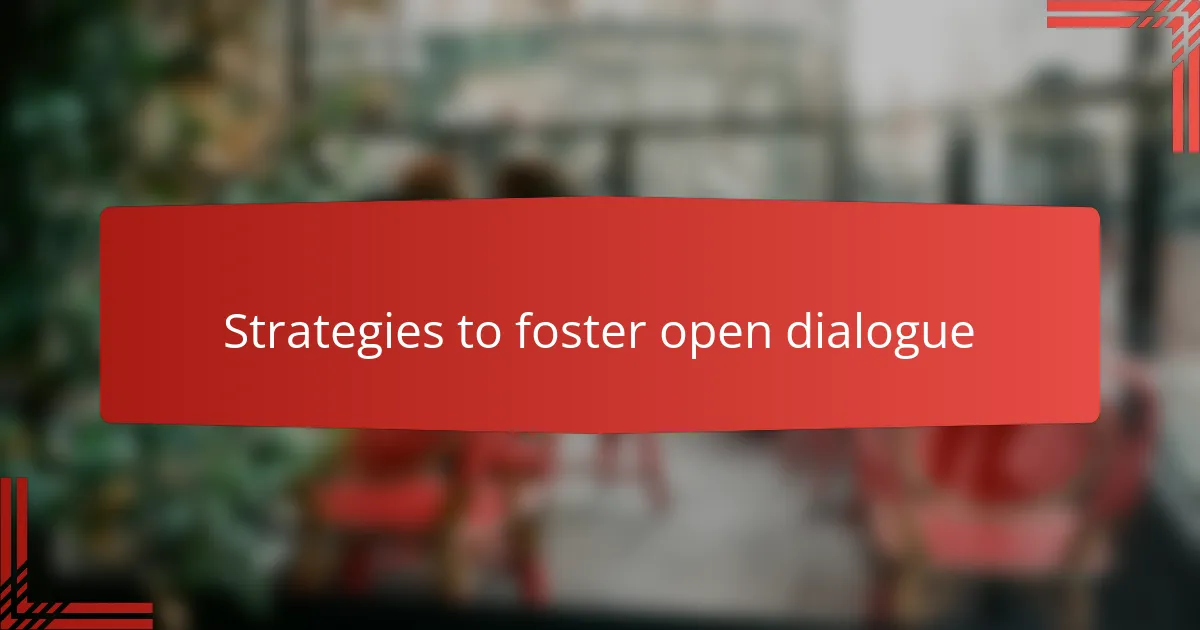
Strategies to foster open dialogue
One strategy I’ve found effective is setting clear guidelines that encourage respect and active listening. When everyone knows it’s okay to disagree but not to interrupt or dismiss, the room feels safer—and trust starts to grow. Have you noticed how simply feeling heard can soften even the toughest conversations?
I’ve also seen the power of small group discussions within larger town halls. Breaking into smaller circles gives quieter voices a chance to speak up without feeling overwhelmed. It’s amazing how much richer the dialogue becomes when more people participate authentically.
Another approach I value is inviting diverse perspectives intentionally. When the group reflects the full community, from age to background, the conversation deepens and broadens in ways a homogenous crowd never could. Doesn’t it make you wonder what important insights we might be missing when some voices are left out?
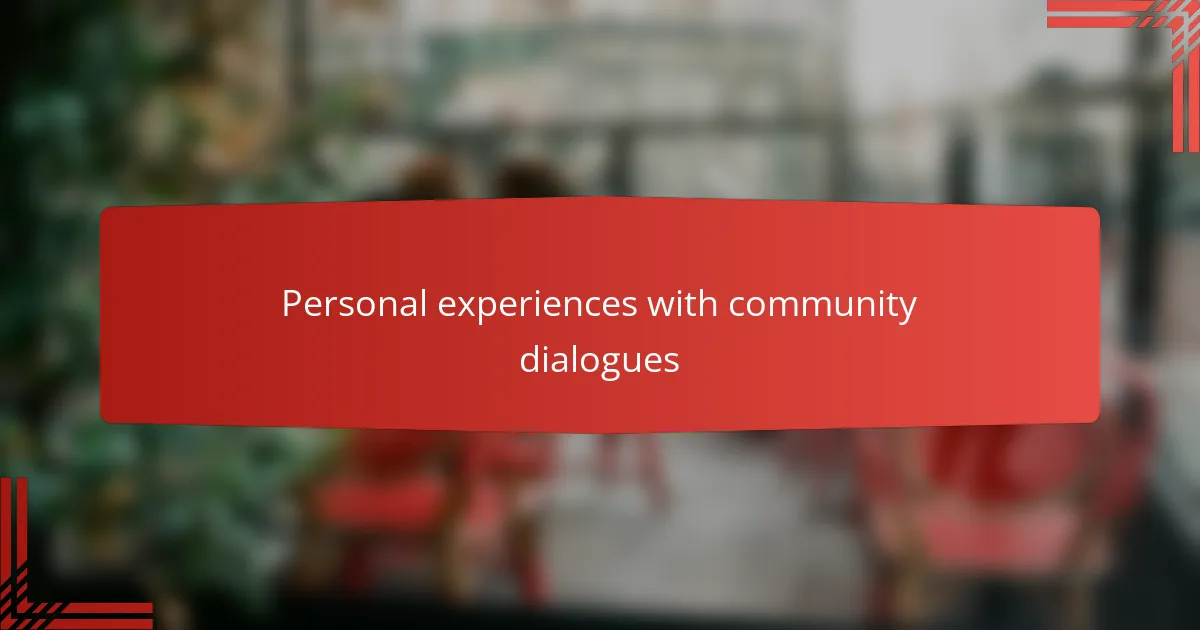
Personal experiences with community dialogues
I recall one Philadelphia town hall where a disagreement seemed destined to derail the conversation, but someone’s willingness to pause and truly listen shifted the entire energy. It made me realize that personal stories hold the power to soften even the most entrenched views. Have you ever experienced how a simple act of listening can change the course of a dialogue?
There was a moment during another community dialogue when a quiet neighbor shared a concern that hadn’t been voiced before. That brief contribution sparked a series of ideas that turned into a collaborative neighborhood project. It amazed me how giving space to even one voice can ignite collective action.
Sometimes, I think about the emotional layers in these dialogues—the frustration, hope, and sometimes fear that people bring into the room. Being part of those conversations has taught me the importance of patience and empathy. Isn’t it incredible how acknowledging emotions can open doors to understanding that logic alone might never unlock?
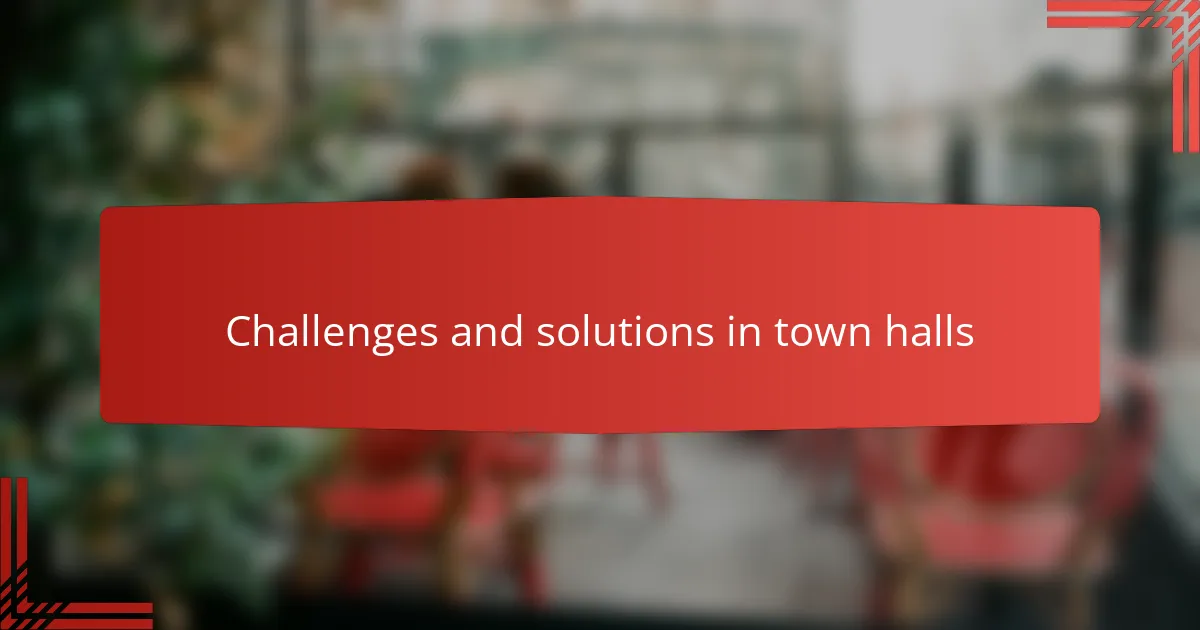
Challenges and solutions in town halls
One challenge I often see in town halls is that people come with strong opinions but sometimes struggle to listen. It’s like everyone is eager to be heard, yet few are ready to hear others. Have you noticed how this dynamic can stall progress? I’ve learned that gently reminding participants about the value of listening can shift the room’s energy toward collaboration.
Another hurdle is ensuring diverse participation. Too often, town halls are dominated by familiar voices, leaving many unheard. From my experience, reaching out beforehand and actively inviting underrepresented groups makes a huge difference. When those new voices join, the conversation becomes richer and more reflective of the community’s real needs.
Lastly, managing emotions during heated discussions can be tough. I remember a town hall where frustration nearly boiled over, but a simple pause to acknowledge feelings helped everyone regain composure. Isn’t it surprising how a moment of empathy can clear the path for clearer dialogue? Creating space for emotions is as important as addressing the facts.
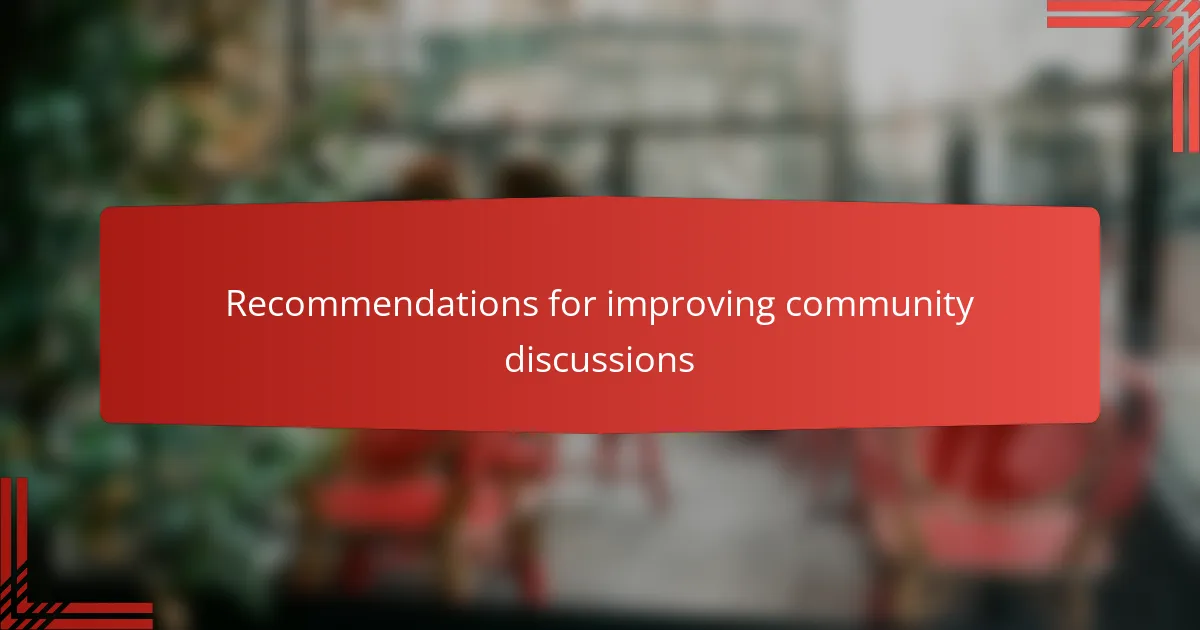
Recommendations for improving community discussions
One recommendation I hold close is creating spaces where every voice feels genuinely welcomed, not just tolerated. I remember at a recent Philadelphia town hall how inviting two or three newcomers to share their thoughts sparked fresh energy, reminding me that when people feel wanted, they show up with their whole selves. Isn’t it remarkable how simple gestures of inclusion can transform a stiff meeting into a vibrant community exchange?
Another approach I find invaluable is using skilled facilitators who can gently steer conversations and manage tensions without dominating. It’s a delicate balance—I’ve seen how a good facilitator’s calm presence can turn frustration into curiosity, helping people listen instead of react. Have you ever noticed how a single person guiding the flow can make dialogue feel more like a shared journey than a debate?
Finally, I recommend embedding moments of reflection during discussions. Pausing for a breath or a shared summary gives everyone a chance to absorb what’s been said and think before responding. From my experience, these pauses reduce misunderstandings and build empathy, turning noisy exchanges into meaningful conversations. Could this simple habit be the secret ingredient we’ve been missing in crowded town halls?